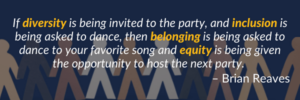This website uses cookies so that we can provide you with the best user experience possible. Cookie information is stored in your browser and performs functions such as recognising you when you return to our website and helping our team to understand which sections of the website you find most interesting and useful.
We’ve gone from a focus on D&I (Diversity & Inclusion) to a more robust concept of DEIB (Diversity, Equity, Inclusion & Belonging). But what is DEIB and why the sudden onset?
DEIB (Diversity, Equity, Inclusion & Belonging) has been elevated into the spotlight due to societal changes that have been occurring over the past few years. The “Diversity & Inclusion” buzz words and strategies are no longer sufficient to the current multi-generation workforce. The younger workforce is demanding work-life balance, transparency in all areas, and an established culture of belonging. If an organization cannot provide that sense of trust and opportunity for growth, employees have proven they will not remain engaged, seeking employment elsewhere.
Today’s job seekers and employees are seeking robust inclusion programs from employers and expecting elevated conversations from industry thought leaders, business executives, and all forms of government. They want to make sure that companies have integrated these programs into their day-to-day and are not just window dressing. The goal: attain equity in all areas of life and embrace everyone’s differences. Society is evolving, and the majority of today’s workforce is focused on inclusivity.
Defining DEIB
Diversity: Diversity can be summed up in one word – variety. Variety can include age, ethnicity, sexual orientation, genders, disabilities, levels of education and cultural backgrounds. Employing people with an array of social identities has proven to enrich company culture, increase workplace productivity and innovation, and positively affect organizations’ bottom line.
Equity: Equity is ensuring that there are resources, access and opportunities in place to guarantee all individuals can grow and succeed. These levels of support should be varied and specific to everyone’s skills or needs. Equity, in the workplace, should directly reflect the promotion of fairness, justice and objectivity with all business processes and procedures.
Inclusion: Inclusion is the celebration of differences, the hearing of voices and making individuals feel seen. Employees want to feel respected and valued and feel comfortable enough to be their authentic self. Inclusion is often paired with transparency of workplace polices, decision-making, hiring and promotion procedures. When outlining your organization’s diversity endeavors, your program’s foundation should be built upon inclusion.
Belonging: Belonging should be the emotional goal of your workplace inclusivity efforts. That feeling of being welcomed – a connection to positive relationships within your organization. Belonging comes about when your inclusive workplace initiatives are successfully working in harmony.


As the world around us continues to evolve, make the time to reflect upon the moments and situations where you felt valued and comfortable to be your authentic self. Embrace that feeling, then want the same for others that surround you. Having empathy for others who may not have had the same life experiences is critical for the advancement of DEIB in the workplace. As today’s workforce wants workplace accountability from its senior management, it is important not to lose sight of the fact that the responsibility for its success belongs to us all. The DEIB acronym may stay or be altered again, but the concepts of acceptance and belonging are values that will continue to unite us all.
When considering your Diversity strategies, remember that hiring is only the beginning. The work towards ‘belonging’ must continue to retain the talent you’ve worked hard to attain. For help with your diversity hiring goals, check out Broadbean’s Diversity Network here.

